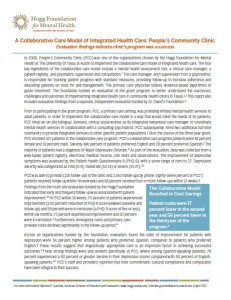A Collaborative Care Model of Integrated Health Care: People’s Community Clinic
In 2006, People’s Community Clinic (PCC) was one of five organizations chosen by the Hogg Foundation for Mental Health at The University of Texas at Austin to implement the collaborative care model of integrated health care. The four key ingredients of the collaborative care model include a mental health assessment tool, a clinical care manager, a patient registry, and psychiatric supervision and consultation. The care manager, with supervision from a psychiatrist, is responsible for tracking patient progress with standard measures, providing follow-up to increase adherence and educating patients on tools for self-management. The primary care physician utilizes evidence-based algorithms to guide treatment. The foundation funded an evaluation of the grant program to better understand the successes, challenges and outcomes of implementing integrated health care in community health clinics in Texas. This report also includes evaluation findings from a separate, independent evaluation funded by St. David’s Foundation.
Prior to participating in the grant program, PCC, a primary care setting, was providing limited mental health services to adult patients. In order to implement the collaborative care model in a way that would meet the needs of its patients, PCC hired an on-site bilingual, licensed, clinical social worker as its integrated behavioral care manager to coordinate mental health services in collaboration with a consulting psychiatrist. PCC subsequently hired two additional full-time counselors to provide integrated services to other specific patient populations. Over the course of the three-year grant, PCC enrolled 322 patients in the collaborative care program. PCC’s collaborative care program patients were 81 percent female and 19 percent male. Seventy-two percent of patients preferred English and 28 percent preferred Spanish. The majority of patients had a diagnosis of Major Depressive Disorder. As part of the evaluation, data was collected from a web-based patient registry, electronic medical records, site visits and observations. The improvement of depressive symptoms was assessed by the Patient Health Questionnaire-9 (PHQ-9), with a score range of zero to 27. Depression severity was categorized as mild (0-9), moderate (10-14) or severe (15-27).
PCC was able to provide 1,116 follow-ups in the clinic and 2,553 follow-ups by phone. Eighty-seven percent of PCC’s patients received follow-up within three weeks and 66 percent received four or more follow-ups within 12 weeks. Findings from the multi-site evaluation funded by the Hogg Foundation indicated that early and frequent follow-up was associated with patient improvement. At PCC within 16 weeks, 70 percent of patients experienced improvement (a 50 percent reduction of PHQ-9 score between baseline and follow-up) and 59 percent were in remission (a PHQ-9 score of five or less). Within six months, 72 percent experienced improvement and 52 percent were in remission. Furthermore, emergency room and primary care provider visits declined significantly in the follow-up period.
Across all organizations funded by the foundation, evaluators found the odds of improvement for patients with depression were 54 percent higher among patients who preferred Spanish, compared to patients who preferred English. These results suggest that linguistically appropriate care is an important factor in achieving successful outcomes. These strong findings were also evident specifically at PCC, where among Spanish-speaking patients, 78 percent experienced a 50 percent or greater decline in their depression scores compared with 50 percent of English-speaking patients. PCC’s staff and providers reported that their commitment, cultural competence and compassion have been integral to their success.
Evaluators highlighted the fact that PCC’s approach was truly non-hierarchical and multidisciplinary, which is essential to successful integrated health care initiatives. The evaluators found that strong support from the clinic leadership and a commitment to integrated care was evident. They also found that PCC achieved a well-integrated system of care. Of the five organizations participating in the Hogg Foundation grant program, PCC had the best outcomes.3 PCC continues to provide an Integrated Behavioral Health Program to existing adult and adolescent patients with diagnoses of depression and anxiety. The clinic is a partner of the Integrated Care Collaboration, a nonprofit alliance of health care providers in Central Texas dedicated to the collection, analysis and sharing of health information with the goal of improving health care quality and cost efficiency across the continuum of care.
Download the full document with footnotes.

